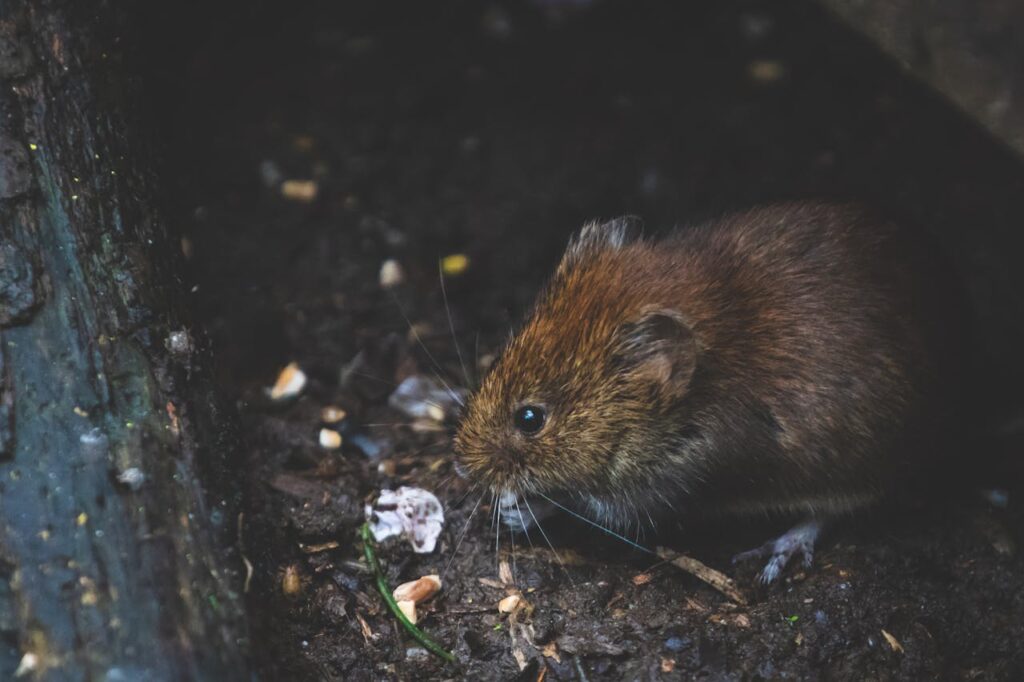How to Keep Rodents Out of Your Bakersfield Home

Rodent infestations are a common problem for homeowners, leading to significant issues such as health risks, property damage, and the overall difficulty of eradicating these pests once they take hold. Keeping rodents out of your home is essential for maintaining a safe and healthy living environment. This article will guide you through understanding rodents, identifying signs of their presence, preventive measures, natural deterrents, traps and baits, professional pest control services, and ongoing maintenance and monitoring.
Understanding Rodents in Bakersfield
Common Types of Rodents in Bakersfield
The most common rodents that invade homes are mice and rats but Bakersfield does also have possums, skunks, squirrels and racoons. Mice are typically smaller, with a body length of 3-4 inches, while rats are larger, measuring 7-9 inches. Both types of rodents can cause significant damage and pose health risks. Mice and rats are known for their gnawing habits, which can damage wires, furniture, and even the structure of your home.
Why Rodents Invade Homes
Rodents invade homes primarily in search of food, water, and shelter. They are attracted to the warmth and availability of resources in human habitats, making your home an ideal environment for them to thrive. Understanding what attracts rodents to your home can help you take preventive measures to keep them out.
Identifying Signs of Rodent Presence
Physical Evidence
Look for droppings, gnaw marks, and nesting materials such as shredded paper or fabric. These are clear indicators of rodent activity. Droppings are typically found near food sources or nesting areas, while gnaw marks can appear on food packaging, furniture, or wiring. Nesting materials are often located in secluded areas like attics, basements, or behind appliances.
Noises and Smells
Be alert to sounds like scratching or scurrying, especially at night. Rodents are nocturnal and are most active when the house is quiet. Musty odors can also signify a rodent infestation. These smells are often the result of rodent urine and can be particularly strong in areas with heavy infestations.
Visual Sightings
Seeing a rodent during the day often indicates a severe infestation, as rodents are typically nocturnal and hide during daylight hours. If you spot a rodent in broad daylight, it’s a sign that there are likely many more hidden in your home.
Preventive Measures to Keep Rodents Out
1. Seal Entry Points
Inspection
Regularly inspect your home for potential entry points. Check areas such as doors, windows, vents, and utility openings. Pay special attention to gaps around pipes, cables, and any other openings that could provide access to your home.
Common Entry Points
Focus on common entry points like gaps around doors and windows, cracks in the foundation, and openings around pipes and vents. Rodents can squeeze through very small openings, so it’s essential to seal even the tiniest gaps.
Sealing Techniques
Use materials such as caulk, steel wool, and weatherstripping to seal gaps and holes. Ensure all potential entry points are adequately sealed to prevent rodents from entering. For larger gaps, use hardware cloth or metal sheeting to provide a more durable barrier.
2. Eliminate Food Sources
Proper Food Storage
Store food in rodent-proof containers and keep pet food secured. Avoid leaving food out overnight. Make sure to store dry goods like cereals, grains, and pet food in airtight containers made of metal or heavy-duty plastic.
Cleanliness
Maintain a clean kitchen and dining area. Wipe down surfaces and clean up crumbs immediately to avoid attracting rodents. Regularly clean under appliances, inside cabinets, and other areas where food debris can accumulate.
Outdoor Food Sources
Secure garbage bins and manage compost piles to prevent rodents from finding food sources outside your home. Use bins with tight-fitting lids and consider using animal-proof containers for compost.
3. Reduce Clutter
Indoor Clutter
Minimize clutter in living spaces, basements, and attics to eliminate hiding places for rodents. Regularly declutter and organize storage areas. Keep items off the floor and store belongings in sealed containers whenever possible.
Outdoor Clutter
Maintain a clean yard by trimming bushes and trees and removing debris. This reduces potential nesting sites for rodents. Keep firewood stacks away from the house and elevate them off the ground to prevent rodents from nesting there.
4. Proper Waste Management
Indoor Trash
Use covered trash bins and take out the trash regularly to avoid attracting rodents. Clean your trash bins frequently to remove any food residue that might attract pests.
Outdoor Trash
Ensure outdoor bins are sealed and placed away from the home to deter rodents from entering. Use heavy-duty trash bags and secure the lids with bungee cords or straps if necessary.
Natural Rodent Deterrents
1. Essential Oils
Types of Oils
Peppermint and eucalyptus oils are known to repel rodents. These oils have strong scents that are unpleasant to rodents and can help keep them at bay.
Usage
Apply these oils around your home, particularly near entry points and areas where rodent activity is suspected. You can also soak cotton balls in essential oils and place them in cabinets, under sinks, and in other areas where rodents might enter.
2. Herbs and Plants
Repellent Plants
Plants such as mint and lavender can help deter rodents. These plants have strong scents that rodents find unappealing.
Placement
Place these plants around your home, especially near entry points and common rodent pathways. Planting them in window boxes, near doors, and along the foundation can create a natural barrier against rodents.
3. Homemade Repellents
DIY Solutions
Create homemade rodent repellents using common household items such as vinegar and ammonia. These substances have strong odors that can repel rodents.
Application
Apply these solutions around entry points and areas where rodents are active. Be cautious when using ammonia and other strong chemicals, as they can be harmful to pets and children.
Traps and Baits
1. Types of Traps
Snap Traps
Effective for quickly eliminating rodents. Place traps in areas with high rodent activity, such as along walls and near entry points.
Live Traps
Use live traps for humane rodent removal. Release captured rodents far from your home to prevent them from returning.
Glue Traps
Glue traps can be effective but are less humane. Consider other options first, as glue traps can cause prolonged suffering for the rodents.
2. Effective Baiting
Choosing Bait
Peanut butter, cheese, and seeds are effective baits for traps. These foods are highly attractive to rodents and can increase the success of your trapping efforts.
Placement
Place traps near entry points, along walls, and in areas where rodent activity is high for maximum effectiveness. Rodents tend to run along walls, so positioning traps in these areas can increase your chances of catching them.
Professional Pest Control Services
1. When to Call a Professional
Signs of Severe Infestation
If you notice persistent rodent activity despite your efforts, it’s time to call a professional. Signs of a severe infestation include frequent sightings, extensive droppings, and significant property damage.
Benefits of Professional Services
661 Pest Solutions has the expertise and tools to effectively eliminate rodent infestations and provide long-term prevention solutions. We can also identify and seal entry points that you might have missed.
2. What to Expect from a Professional Service
Inspection and Assessment
Professionals should assess the severity of the infestation and identify entry points. They should then provide a detailed plan of action to address the problem.
Treatment Plans
They should implement targeted treatments using safe and effective methods. This may include baiting, trapping, and sealing entry points.
Follow-Up Services
Regular follow-up visits ensure that the infestation is completely eradicated and prevent future issues. 661 Pest Solutions will also provide ongoing monitoring and maintenance to keep your home rodent-free.
What Our Customers Say
Many Bakersfield residents have benefited from our professional rodent control services. Here are some testimonials from satisfied customers:
Maintenance and Monitoring
Regular Inspections
Regularly inspect your home for signs of rodents to catch any new infestations early. This includes checking for droppings, gnaw marks, and other indicators of rodent activity.
Ongoing Prevention
Maintain preventive measures such as sealing entry points, proper waste management, and cleanliness to keep rodents at bay. Consistently applying these strategies will help prevent future infestations.
Community Efforts
Work with neighbors to reduce rodent problems in your neighborhood, as infestations can easily spread between homes. Sharing information and resources can help create a rodent-free community.
Keeping rodents out of your home requires a proactive approach that includes sealing entry points, eliminating food sources, reducing clutter, and using natural deterrents. Regular inspections and maintenance are essential for ongoing prevention. If you face a severe infestation, don’t hesitate to call a professional. Implement these strategies to maintain a rodent-free home and ensure a healthy, safe living environment.
FAQs about Rodent Control in Bakersfield
Bakersfield residents often encounter common rodents such as mice and rats, and in some cases skunks, possums, and squirrels. These pests seek shelter in homes year-round, particularly during colder months.
Look for signs such as droppings, gnaw marks on food packaging or furniture, and scratching noises in walls or ceilings. Visual sightings of rodents during daylight hours also indicate a potential infestation.
Rodents can spread diseases through their urine, droppings, and bites. Diseases such as hantavirus, leptospirosis, and salmonellosis pose serious health risks to residents if rodents are present in the home.
Seal entry points, maintain cleanliness, store food in rodent-proof containers, and eliminate standing water sources. Regularly inspect your home for potential entry points and keep outdoor areas tidy to deter rodents.
If preventive measures fail or if you notice persistent rodent activity despite your efforts, it’s advisable to contact a professional rodent control service. We at 661 Pest Solutions can provide thorough inspections, targeted treatments, and ongoing monitoring to ensure your home remains rodent-free.
A professional services in Bakersfield should conduct a detailed inspection of your property, identify entry points, and implement effective treatments tailored to your specific infestation. They also should offer advice on preventing future rodent problems. Trust 661 Pest Solutions to implement these methods.
Look no further for a licensed pest control company with experience in rodent control. 661 Pest Solutions has only 5 star reviews for our quality, care, and experience
